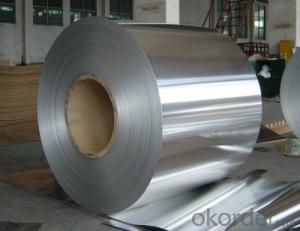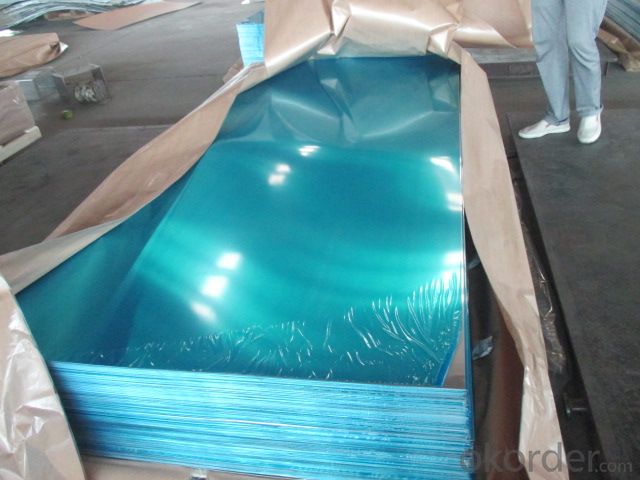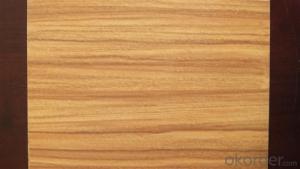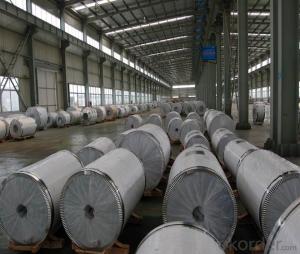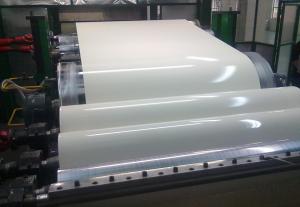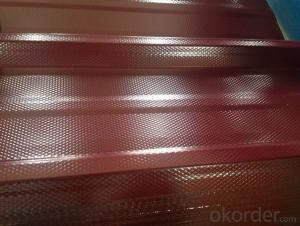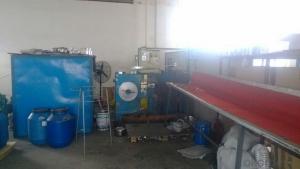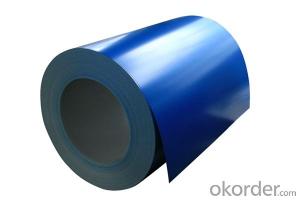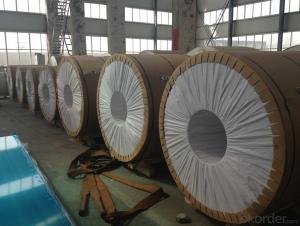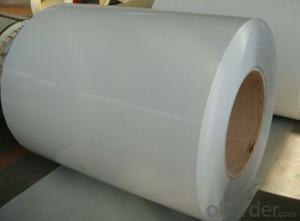Copper Colored Aluminum Coil for Roofing and Ceiling
- Loading Port:
- Tianjin
- Payment Terms:
- TT OR LC
- Min Order Qty:
- 2 m.t.
- Supply Capability:
- 80000 m.t./month
OKorder Service Pledge
OKorder Financial Service
You Might Also Like
Specification
Color Coated Aluminium Coil For Roofing and Ceiling
Description
Alloy | 1060, 1100, 3003, 8011, etc. |
Temper | H16, H18, H24, H26, H28 |
Thickness | From 0.05mm to 3.0mm |
Width | Standard width:1240mm |
Special width:1300mm, 1520mm, 1570mm, 1595mm | |
Diameter | Standard dia:1200mm |
Interior dia:150mm,405mm,505mm | |
Weight | 2.5 T/coil,3.0 T/coil |
Coating | PE, PVDF, ACRYLIC |
Surface | Embossed, mill finish, coated |
Color | AS to code RAL |
Gloss | 10-90%(EN ISO-2813:1994) |
Coating Thickness | PE: more than 18 micron |
PVDF: more than 25 micron | |
Coating Hardness(pencil resistance) | More than 2h |
Coating adhesion | 5J (EN ISO-2409:1994) |
Impact Resistance | No peeling or cracking(50 kg/cm,ASTMD-2794:1993) |
Flexibility(T-bend) | 2T |
MEK resistance | More than 100 |
Advantage | 1.High temperature resistant 2.Weathering resistant 3.Scrubbing resistant 5.Acid or alkali proof 6. Fireproof 7.Light weight material is easy to construct and install |
Out package | Wooden splint with export standard |
Application | ACP, wall cladding, facades, roofs and canopies, ceilings, signboards, blind window, display platforms, electrical panels, etc |
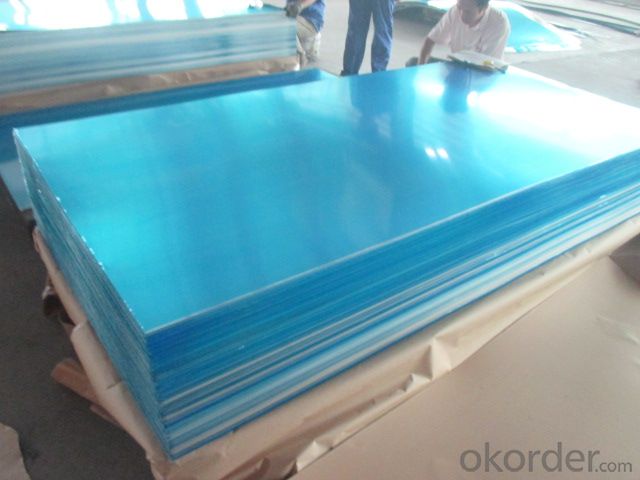
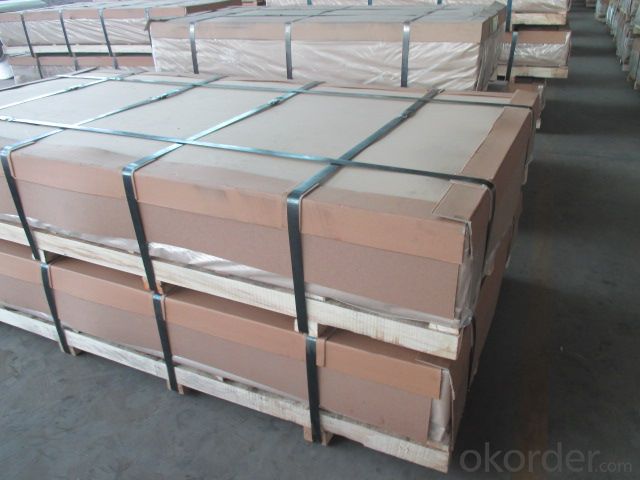
Manufacturing
Decoiler → Accumulator →Tension Leveler →Acid & Alkali Cleaner → Rinse →Conversion Treatment → Priming coater →Infrared Curing Oven →Main coater →Floatation Curing Oven →Strippable Film Applicator → Exit Accumulator → Recoiler
PVDF and PE Coated Aluminium Coils/Sheets
PVDF color pre coated aluminum coils/ sheets:
It is well known that fluorocarbon lacquer coating (PVDF coating) owes the best acid resistant/alkali and temperature tolerant capabilities of all painting materials. Being the best quality of precoated aluminum, PVDF coated coils are especially suitable for outdoor roofing walls and ceiling manufacturing.
Polyester (PE) color pre coated aluminum coils/ sheets :
Using high-grade polyester lacquer coating material, the finished coated coils are with delicate color uniform texture, color and diverse. It is the most popular and most common used materials in decorative usage. The PE coated aluminum are widely used in ACP( aluminum composite panel ) production and indoor ceiling usage.
FAQ
--Q: Do you provide free samples?
--A: Yes, free samples will be sent to you on freight at destination.
--Q: Can I get your latest products catalogue?
--A: Yes, it will be sent to you in no time.
--Q: What is the MOQ?
--A: 2 tons
--Q: What are your payment terms?
--A: We accept L/C, T/T.
--Q: What kinds of alloy can you supply?
--A: 1000 series: 1050, 1060, 1070, 1100, 1145, 1200
3000 series: 3003, 3004, 3105, 3104
5000 series: 5052, 5083, 5754, 5182
6000 series: 6061, 6063, 6062, 6063
8000 series: 8011, 8021
--Q: What kinds of temper can you supply?
--A: O-H112: O,H12,H14,H16,H18,H22,H24,H26,H,32,H34,H111,H112
T3, T4, T6
- Q: What are aluminum coils used for and what are their applications?
- <p>Aluminum coils are versatile metal products that serve various purposes. They are primarily used in construction, manufacturing, and packaging industries. Some common applications include roofing and siding materials, heat exchangers, food and beverage cans, automotive parts, and electrical components. Aluminum coils are valued for their lightweight, corrosion resistance, and high thermal and electrical conductivity, making them ideal for a wide range of applications where durability and efficiency are required.</p>
- Q: remember maybe a decade ago or so, copper used to be cheaper than aluminum. now it is the other way around, copper is more expensive. Even copper pennies cost more so I heard they are mixed with another metal to make a penny. What caused the change in value and when did it really start happening?In fact, copper has become valuble enough to steal. Some factories which have copper, have had their metals stolen, but outsiders who break into the factories to specifically take the copper. Then the factories started hiring security to prevent intruders from taking the copper.
- you didnt even mention the people that break into houses to steal the pipes from the walls. Because copper is much harder to extract, aluminum you just get the bauxite, crush it and put it in water, viola
- Q: What is the elongation of aluminum coils?
- The elongation of aluminum coils refers to the degree to which the coils can be stretched or lengthened before they reach their breaking point. It is a measure of the material's ductility or ability to undergo plastic deformation without fracturing. Aluminum coils typically have a high elongation percentage, typically ranging from 10% to 30%, which means they can be stretched considerably before breaking. This property makes aluminum coils suitable for various applications where flexibility and resilience are required, such as in the manufacturing of electrical cables, automotive parts, and building materials.
- Q: Can aluminum coils be used in architectural applications?
- Aluminum coils, indeed, find application in architectural projects. The construction industry frequently employs aluminum due to its adaptability, endurance, and ease of manipulation. Architects often make use of aluminum coils for roofing, cladding, and facades, thanks to their malleability in creating diverse forms and proportions. Furthermore, these coils can be coated with various finishes to improve their visual appeal and safeguard against weathering and discoloration. Ultimately, given their blend of utility, attractiveness, and durability, aluminum coils have become a favored option for architectural purposes.
- Q: What is the role of aluminum coils in HVAC systems?
- The role of aluminum coils in HVAC systems is crucial for the efficient functioning of the system. Aluminum coils are an essential component of the air conditioning unit as they are responsible for transferring heat between the indoor and outdoor environments. When the air conditioning unit is in cooling mode, the aluminum coils act as evaporator coils. They help in absorbing heat from the indoor air, thus cooling it down. The warm air from the room passes over the cold aluminum coils, and the heat is transferred to the refrigerant flowing through the coils. This process cools the air and removes moisture, resulting in the desired cooling effect. In heating mode, the aluminum coils function as condenser coils. They receive the hot refrigerant from the compressor and transfer the heat to the surrounding air. This hot air is then distributed throughout the building, providing warmth during colder weather. Aluminum coils are preferred in HVAC systems due to their excellent heat transfer properties and resistance to corrosion. They are lightweight, durable, and have a high thermal conductivity, allowing for efficient heat exchange. Moreover, aluminum coils are more environmentally friendly compared to other materials like copper, as they are easier to recycle. Regular maintenance and cleaning of the aluminum coils are necessary to ensure optimal performance and prevent any airflow restrictions caused by dust, dirt, or debris buildup. Neglecting coil maintenance can lead to reduced cooling or heating capacity, decreased energy efficiency, and potential system breakdowns. Overall, aluminum coils play a vital role in HVAC systems by facilitating the heat transfer process, enabling efficient and effective temperature control in both cooling and heating modes, and contributing to the overall comfort and functionality of the system.
- Q: I'm doing a project on aluminum and this is the one thing i can't find. Also will it rust, tarnish or corrode?
- Aluminum is actually highly reactive. Under normal conditions, its outer layer quickly forms a coating of aluminum oxide which is extremely hard and well-attached. This prevents any further corrosion or oxidation. Molten aluminum will react explosively with water; this is a well-known danger in the aluminum casting industry. Very finely powdered aluminum is pyrophoric (self-igniting in air) and is used as a component in flash powder and some solid rocket fuels.
- Q: Are aluminum coils suitable for marine applications?
- Indeed, aluminum coils prove to be fitting for marine applications. As a material resistant to corrosion, aluminum becomes an ideal option for deployment in marine settings that often encounter saltwater and other forms of corrosive elements. Lightweight, long-lasting, and boasting a high strength-to-weight ratio, aluminum coils hold significance in marine applications where weight reduction is sought after. Moreover, aluminum coils exhibit resilience in the face of extreme temperatures and possess commendable thermal conductivity, rendering them suitable for diverse marine heating and cooling systems. In summary, aluminum coils enjoy popularity in marine applications owing to their corrosion resistance, durability, and lightweight attributes.
- Q: Are there any specific installation requirements for aluminum coils?
- Yes, there are specific installation requirements for aluminum coils. When installing aluminum coils, it is important to consider a few factors. Firstly, it is crucial to ensure that the coils are properly supported and secured during installation. Aluminum coils can be quite heavy, so adequate support is essential to prevent sagging or damage. This may involve using appropriate brackets or support structures to ensure the coils are securely mounted. Secondly, it is important to consider the location and environment where the coils will be installed. Aluminum coils are often used in HVAC systems, and it is crucial to ensure that the installation area is free from any corrosive substances or chemicals that could potentially damage the coils. Additionally, proper ventilation should be provided to prevent any buildup of heat or moisture, which can affect the performance and lifespan of the coils. Furthermore, it is essential to follow the manufacturer's guidelines and recommendations for installation. This may include specific instructions regarding the type of fasteners or connectors to use, proper spacing between coils, and any other specific requirements for the particular aluminum coil being installed. Adhering to these guidelines will ensure the optimal performance and longevity of the coils. Lastly, it is highly recommended to have the installation of aluminum coils carried out by a professional who is experienced in handling and installing these components. This will ensure that the installation is done correctly, minimizing the risk of any issues or damage that may arise from improper installation. In summary, specific installation requirements for aluminum coils include proper support, consideration of the installation environment, adherence to manufacturer guidelines, and professional installation. Following these requirements will help ensure the optimal performance and longevity of the aluminum coils.
- Q: How are aluminum coils stored in a warehouse?
- Aluminum coils are commonly kept in a warehouse to guarantee their safety and easy accessibility. Depending on the available space and coil weight, they are typically arranged in rows either vertically or horizontally. To maintain their shape and prevent any harm, pallets or racks are often used to provide support and stability. Additionally, protective materials like shrink wrap or plastic sheets can be wrapped around the coils to shield them from dust, moisture, and other potential dangers. Proper labeling and organization are also essential for efficient inventory management and easy retrieval. Ultimately, the objective of storing aluminum coils in a warehouse is to make the most of the space, minimize the risk of damage, and ensure they are ready for shipment or further processing.
- Q: Can aluminum coils be used in high-temperature applications?
- Yes, aluminum coils can be used in high-temperature applications. Aluminum has a high melting point of 660 degrees Celsius (1220 degrees Fahrenheit), which makes it suitable for various high-temperature environments. Additionally, aluminum has excellent thermal conductivity, allowing it to efficiently transfer heat, making it a popular choice for heat exchangers and HVAC systems. However, it is important to note that the specific application and temperature requirements should be considered, as extremely high temperatures beyond the melting point of aluminum may require alternative materials.
Send your message to us
Copper Colored Aluminum Coil for Roofing and Ceiling
- Loading Port:
- Tianjin
- Payment Terms:
- TT OR LC
- Min Order Qty:
- 2 m.t.
- Supply Capability:
- 80000 m.t./month
OKorder Service Pledge
OKorder Financial Service
Similar products
Hot products
Hot Searches
Related keywords
